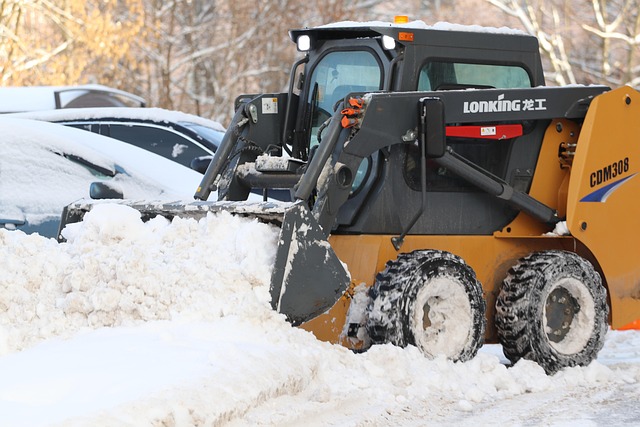In Windsor, commercial snow removal service providers must navigate local regulations and permit requirements for legal, efficient, and community-friendly operations. When drafting contracts, vital components include scope of work (plowing, salting), geographic coverage, clearing intervals, liability insurance, indemnification, payment terms, and risk management provisions to protect all parties. Clarity, comprehensiveness, and tailored negotiation ensure effective snow removal services while mitigating risks in Windsor's unique context.
Creating a robust commercial snow removal contract is essential for businesses operating in Windsor, considering the region’s harsh winters. This guide navigates the process, from understanding local regulations and permits to crafting key elements, managing risks, and negotiating agreements. By adhering to these practices, businesses can ensure efficient snow clearance, mitigate liabilities, and foster strong relationships with contractors, enhancing safety and operations during snowy seasons in Windsor.
- Understanding Windsor's Snow Removal Regulations and Permits
- Key Elements to Include in a Commercial Snow Removal Contract
- Risk Management and Insurance Requirements for Snow Removal Contracts
- Drafting and Negotiating Effective Snow Removal Agreements
Understanding Windsor's Snow Removal Regulations and Permits

In Windsor, the process of commercial snow removal involves a deep understanding of local regulations and permit requirements. Businesses offering snow clearing services must adhere to specific guidelines set by the city to ensure safe and efficient clearance. One key aspect is obtaining the necessary permits, which may vary depending on the scope and frequency of the removal work. These permits are crucial for any commercial operation looking to provide snow removal services within Windsor’s borders.
Local laws often dictate the timing, methods, and equipment used for snow clearing. For instance, there might be restrictions on when and how frequently snow can be removed to prevent disruptions to nearby residents and businesses. Understanding these regulations is essential for crafting a comprehensive commercial snow removal contract. By adhering to Windsor’s guidelines, contractors can ensure their operations are legal, efficient, and well-received by the community.
Key Elements to Include in a Commercial Snow Removal Contract

When drafting a commercial snow removal contract for Windsor, ensure it includes vital components to set clear expectations and protect all parties involved. First, outline the scope of work, detailing specific snow removal tasks such as plowing, salting, and shoveling. Specify the areas covered, including parking lots, entrances, and walkways. Define the schedule, setting regular clearing intervals during winter months and outlining emergency response times.
Next, address liability and insurance requirements. Clearly state that the contractor is responsible for obtaining and maintaining adequate insurance coverage, including liability protection to safeguard against potential property damage or personal injuries. Include provisions for indemnification, where the contractor agrees to hold the property owner harmless for any claims arising from their services. Additionally, specify payment terms, outlining fees, billing cycles, and late payment penalties to ensure timely compensation.
Risk Management and Insurance Requirements for Snow Removal Contracts

When drafting a commercial snow removal contract in Windsor, it’s crucial to address risk management and insurance requirements. These clauses are essential to protect both the property owner and the service provider. The contractor should have comprehensive liability insurance covering accidents or injuries that may occur during snow removal activities. This includes coverage for property damage and personal injury liabilities. Additionally, workers’ compensation insurance is vital to ensure the well-being of the contractors’ employees.
The contract should also specify who is responsible for obtaining permits and adhering to local regulations regarding snow removal. Clearly defining these roles minimizes legal risks and ensures compliance with Windsor’s specific requirements. Property owners may want to include provisions for risk assessment and safety protocols, outlining the steps the contractor will take to mitigate hazards like ice, heavy snowfall, or extreme temperatures.
Drafting and Negotiating Effective Snow Removal Agreements

When drafting a commercial snow removal contract in Windsor, clarity and comprehensiveness are key. Define the scope of work in detail, including specific services like plowing, salting, and snow clearing. Specify the geographic area covered and any additional responsibilities, such as ice management or emergency response. Use clear language to outline timing, frequency, and deadlines, ensuring both parties understand expectations.
Negotiation is an integral part of crafting a fair agreement. Address issues like payment terms—including pricing structures, late fees, and invoicing procedures—and insurance requirements. Consider including provisions for maintenance, safety protocols, and dispute resolution mechanisms. Engaging in open dialogue allows for tailoring the contract to meet unique business needs while mitigating risks associated with snow removal services in Windsor.




